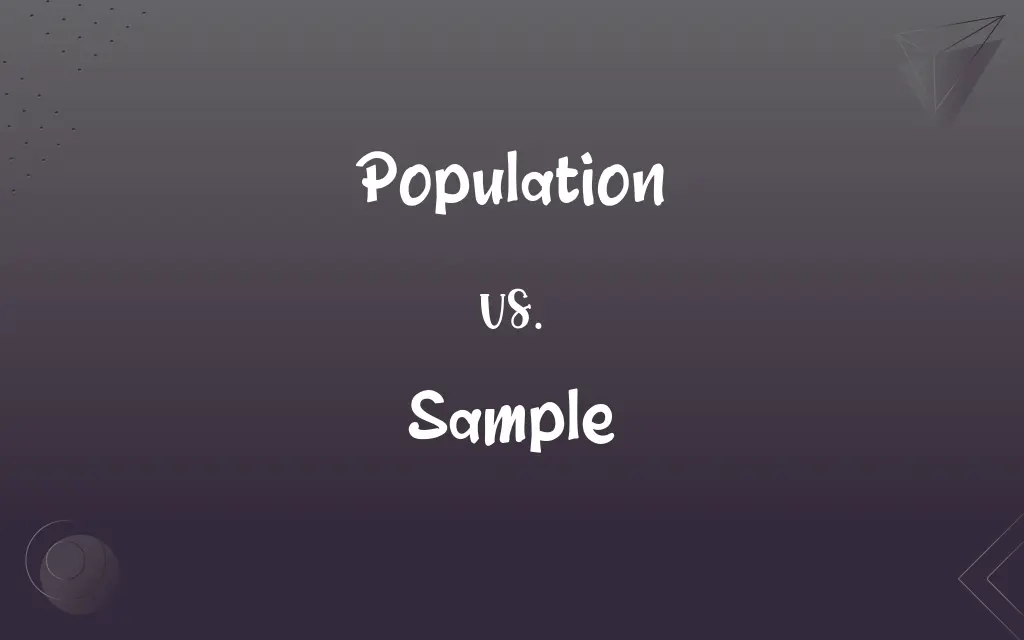Population vs. Sample: What's the Difference?
Edited by Aimie Carlson || By Harlon Moss || Updated on October 19, 2023
A population includes all members of a defined group, while a sample is a subset of that population chosen for analysis.

Key Differences
In the realm of statistics and research, a population pertains to the entire group about which information is desired. This could mean the entire human race, all students in a school, or any other complete group. A sample, contrastingly, represents a fraction or subset of that population, selected to participate in a particular study.
Gathering data from an entire population can be exhaustive, both in terms of resources and time. Hence, researchers often turn to samples to collect data, making it more feasible. The key is ensuring that the sample accurately represents the broader population.
Data gathered from a population provides definitive and conclusive results about that group. However, when data is sourced from a sample, it offers insights into the probable characteristics or behaviors of the entire population, necessitating the use of inferential statistics.
Studying an entire population guarantees complete accuracy concerning that group's characteristics. However, with a sample, there's always an element of uncertainty or error, given that it's a subset and might not capture every nuance of the population.
Surveying an entire population often comes with high costs, extensive time requirements, and sometimes, sheer infeasibility. A sample, being smaller, is usually more manageable, cost-effective, and practical for most research purposes.
ADVERTISEMENT
Comparison Chart
Definition
Entire group under study
Subset of the population
Data Accuracy
100% accurate for the group
Subject to sampling error
Purpose in Research
Provides conclusive data
Used for inferential statistics and generalization
Size
Large (can be infinite)
Smaller than the population
Resource Requirement
High (time, money, effort)
More manageable and cost-effective
ADVERTISEMENT
Population and Sample Definitions
Population
All organisms of a particular species living in a specific area.
The deer population in the forest has been increasing.
Sample
A representative subset of a larger group or population.
The researchers took a sample of 100 students to conduct the survey.
Population
A main group from which a statistical sample is drawn.
The study aimed to determine the average height of the adult population.
Sample
An instance or single occurrence for inspection or analysis.
He provided a sample of his writing for the application.
Population
The total amount in a particular category or set.
The population of data points in this dataset is vast.
Sample
A brief segment of a musical or auditory recording.
The musician used a vintage song sample in his new track.
Population
The total number of inhabitants in a particular area.
The population of the small town is just 3,000.
Sample
A small part or quantity intended to show what the whole is like.
She received a sample of the new perfume.
Population
The entire group or category being studied or analyzed.
The population of New York City exceeds eight million.
Sample
A specimen taken for scientific testing or analysis.
The lab requires a blood sample for testing.
Population
All of the people inhabiting a specified area.
Sample
A portion, piece, or segment that is representative of a whole
Showed samples of a new stretch fabric.
Population
The total number of such people.
Sample
A specimen taken for analysis or testing
A blood sample.
A water sample.
FAQs
What is a population in statistics?
In statistics, a population refers to the entire set of individuals or items under study.
How is "population" different from "community"?
A population comprises all individuals of a specific species in a particular area, while a community includes all populations of different species living and interacting in a certain area.
What is a sample in statistics?
A sample is a subset of individuals or items selected from a larger population.
Is population only used to refer to people?
No, while "population" commonly refers to people, it can also refer to any complete group, such as the population of animals in a region or the population of data points in a dataset.
How is a sample size decided?
Sample size is determined based on the desired accuracy, confidence level, variability in the population, and sometimes budget constraints.
What is the difference between a parameter and a statistic?
A parameter describes a characteristic of a population, while a statistic describes a characteristic of a sample.
What's the advantage of using a sample over studying the whole population?
Sampling is often more feasible, cost-effective, and faster than studying an entire population.
How does "population variance" differ from "sample variance"?
Population variance measures the spread of data in the entire population, while sample variance measures it in a sample. Their formulas differ slightly in the denominator.
What is "sampling bias"?
Sampling bias occurs when a sample is not representative of the population from which it was drawn.
What is a "population density"?
Population density is the number of individuals of a population per unit area.
How is "population size" determined?
Population size can be determined through censuses, surveys, or estimation methods based on samples.
What is "random sampling"?
Random sampling is a method where every member of the population has an equal chance of being selected in the sample.
How are population and sample related?
A sample is derived from a population, and it's used to make inferences or predictions about the entire population.
Can a sample be larger than the population?
No, a sample is always a subset of the population and cannot be larger.
Is the sample always representative of the population?
Ideally, a sample should be representative, but biases or poor sampling techniques can lead to unrepresentative samples.
What is a "stratified sample"?
In stratified sampling, the population is divided into non-overlapping groups (or "strata"), and samples are taken from each group.
Why do researchers use samples?
Researchers use samples to gather information and make inferences about the entire population without examining every individual or item.
What is "sampling error"?
Sampling error is the difference between a statistic from a sample and the true population parameter.
Can a sample have the same size as its population?
Yes, if every member of the population is selected, the sample size would equal the population size. This is known as a census.
How do we ensure a sample is reliable?
Ensuring randomness, minimizing biases, using appropriate sampling techniques, and having a sufficient sample size can help in achieving a reliable sample.
About Author
Written by
Harlon MossHarlon is a seasoned quality moderator and accomplished content writer for Difference Wiki. An alumnus of the prestigious University of California, he earned his degree in Computer Science. Leveraging his academic background, Harlon brings a meticulous and informed perspective to his work, ensuring content accuracy and excellence.
Edited by
Aimie CarlsonAimie Carlson, holding a master's degree in English literature, is a fervent English language enthusiast. She lends her writing talents to Difference Wiki, a prominent website that specializes in comparisons, offering readers insightful analyses that both captivate and inform.































































